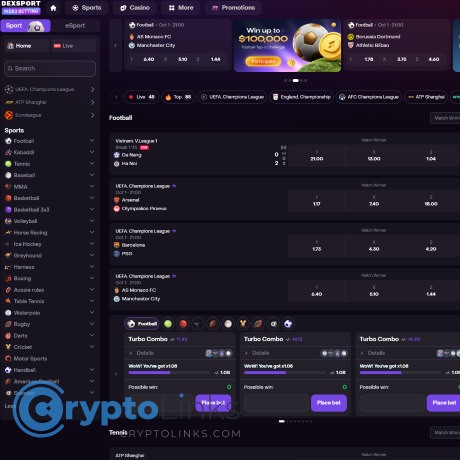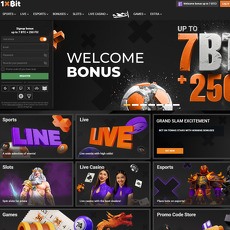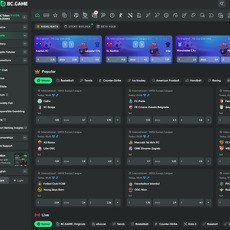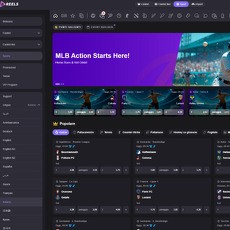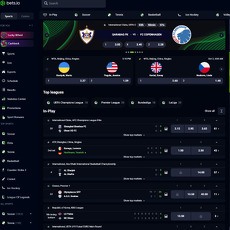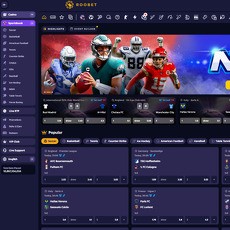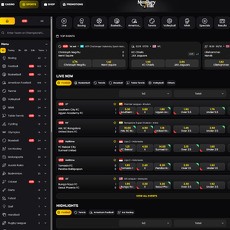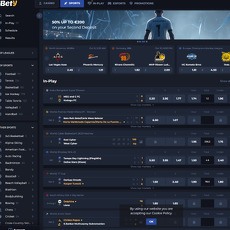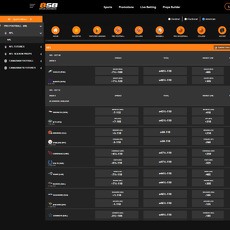Dexsport Review
Dexsport
dexsport.io
Dexsport Ultimate Review Guide + FAQ: Fast Web3 Betting With Real Pros, Cons, and Tips
Ever hit a sweet parlay only to watch the cashier screen say “under review” for days? Or try to cash out a modest win and suddenly get asked for a stack of documents you’ve already submitted twice? If that sounds familiar, keep reading.
The big benefit with Dexsport: you keep control of your funds. Connect a wallet, bet across sports, esports, and casino, and move your crypto instantly without waiting for support to “approve” your cashout.
I’ve tested hundreds of crypto platforms, and the pattern is clear: the more hands your money passes through, the slower your experience gets. Dexsport takes a different path—wallet-based access, non-custodial control, and fast on-chain settlements across 40+ cryptocurrencies on 20+ blockchains. That combo can seriously reduce friction while keeping things transparent.
What’s broken with most betting sites
Let’s be honest—these are the headaches that make people look for a Web3 alternative:
- Slow withdrawals. Traditional books can hold your funds for 24–72 hours (or longer) on “manual review,” especially after bigger wins or bonus play. You did the work; now you wait.
- Aggressive KYC. Uploads, selfies, PDFs, utility bills…and sometimes the process repeats after every payout. It’s not just annoying; it breaks momentum and can lock funds at the worst time.
- Surprise limits. One hot streak and suddenly your max bet shrinks, or markets you used to hit are “unavailable.” It’s a real confidence killer and ruins any long-term strategy.
- Geoblocking and payment friction. If your card or bank hates gambling transactions—or your location triggers blanket blocks—you’re stuck. Add cross-border fees and it’s a mess.
- “Crypto” that’s still centralized. Plenty of sites take crypto deposits but keep full custody. That means the same payout bottlenecks, approval queues, and opaque decisions.
Real example: I’ve seen a routine 3-leg win get flagged for “risk review” and sit for 48 hours. Zero chargebacks, no bonus abuse. Just a delay because a cashier team needed to “check” the bet. If your edge relies on quick bankroll cycling, that’s unacceptable.
The fix Dexsport aims to deliver
Dexsport is designed to cut out the custody drama:
- Non-custodial, wallet-first access. Connect MetaMask, Trust Wallet, or similar. Your funds stay in your wallet; bets and payouts flow through smart contracts where supported.
- Fast, on-chain payouts. No waiting for a cashier to release “your” money. When the market settles, you can move instantly—gas paid, funds in your control.
- Multi-chain flexibility. Use 40+ cryptos across 20+ blockchains to match your fee and speed preferences. If one network is congested, you’ve got options.
- Transparent odds and a native token (DESU). The DESU token powers utilities inside the ecosystem. Odds and operations aim for on-chain clarity where possible.
Is it perfect? No platform is. You still face market risk, network fees, and the need to protect your wallet. But removing custody roadblocks changes the betting experience in a way most people feel immediately—especially if you’ve ever waited days for a payout that should’ve taken minutes.
What you’ll find in this guide
I’ve structured this review to give you exactly what matters, minus the fluff:
- What Dexsport is and how it works (the wallet-first flow, what you can bet on, and who it suits)
- Key features and real benefits (security, speed, odds, UX, and the true cost to bet)
- DESU token utility (why it exists, how to use it, and the risks)
- Wallets, networks, and fees (practical tips to keep gas low and transactions smooth)
- Legal realities (what to know about KYC, geoblocking, and U.S. sports betting)
- Comparisons (how Dexsport stacks up against traditional books and other Web3 options)
- FAQ (straight answers to the questions people actually ask)
If you’re tired of the “we’ll get back to you in 3–5 business days” routine and want to bet on your terms, this walkthrough will show you how Dexsport tries to make that happen—and where it still has trade-offs.
Ready to see how the wallet-first system actually works and what you can bet on? Let’s start with the basics and keep it simple.
Dexsport at a glance: what it is and how it works
Think of Dexsport as a Web3 sportsbook and casino you access with your crypto wallet—not a username, not an email, and not a balance trapped on a site. You connect, place your bets, and settlements land back in your wallet, on-chain. Simple, fast, and without someone holding your funds behind a cashier window.
“The fastest withdrawal is the one you never have to ask for.”
That’s the whole appeal here: your bankroll stays under your control. Research from industry trackers like DappRadar and Chainalysis shows wallet-based activity keeps growing because users want transparency and ownership. Dexsport leans into that shift with a wallet-first design and on-chain settlement where supported.
How it works (wallet-first, non-custodial)
You don’t create an account in the old-school way. You connect a wallet (MetaMask, Trust Wallet, and others) and verify you’re you by signing a message. No password reset emails, no uploading documents just to check your balance.
- Connect your wallet: Click “Connect,” pick a wallet, and approve the signature request.
- Keep your funds: Your crypto stays in your wallet; Dexsport doesn’t custody your money.
- Place a bet on-chain: When you confirm a wager, you approve the transaction and pay a network fee (gas). The bet is recorded on the blockchain where supported.
- Get paid to your wallet: Winning payouts go back to your wallet. You can see the transaction hash on a block explorer—pure transparency.
Real example: I connected MetaMask, selected a live soccer market, reviewed the odds, and confirmed the transaction. The bet appeared on-chain in seconds. When it settled, the payout hit my wallet without me opening a support ticket or waiting for “24–72 hours” processing. That’s the experience people want from Web3 betting.
Tip: Always double-check you’re on the official site, and make sure your wallet is on the right network with a small gas buffer. If you’ve ever tried sending a transaction with 0 gas, you know the pain.
What you can bet on
Dexsport aims to cover the core action without bloat. You’ll find:
- Sports: Soccer, basketball, football, tennis, MMA, and more—pre-match and in-play.
- Esports: Popular titles like CS, Dota, and League when events are active.
- Casino: Quick-fire games and slots, with options that emphasize fast settlement and provable fairness where available.
Live markets are the highlight for many. Odds update quickly, and you can track the bet’s on-chain status without wondering what happens behind a closed back office.
Who it’s for (and who it’s not for)
- Perfect for:
- Crypto-native bettors who prefer self-custody and wallet-based access.
- In-play fans who want fast settlement and quick market navigation.
- Privacy-conscious users who don’t want custodial accounts or approval queues.
- Multi-chain users who already move between networks and manage gas smartly.
- Probably not for:
- People who want traditional fiat rails and card withdrawals.
- Bonus hunters chasing giant fiat promos with high rollover requirements.
- Anyone who prefers a fully hand-holding service with phone support and account managers.
- Users who don’t want to manage gas fees or keep track of networks.
If you want control, speed, and the ability to verify transactions yourself, the wallet-first model feels refreshing. If you want a bank-like experience and paper trails for everything, you’ll find the non-custodial approach a bit barebones.
Curious what really sets Dexsport apart when it comes to security, speed, and costs? In the next section, I’ll break down the standout advantages (and a few trade-offs) so you can decide if this Web3 setup actually gives you an edge—or just a new login button.
Key benefits and standout features
Security and control
If you’ve ever had a payout stalled for “manual review,” you know the pain. With a non-custodial setup, your bankroll sits in your wallet, not in a platform’s internal ledger. You connect, place a bet, and settlements happen on-chain where supported—no waiting for a cashier to “release” your money.
“Trust is good. Control is better.”
Real talk: after high-profile collapses in 2022, keeping keys in your own wallet isn’t just a crypto ethos—it’s survival. On Dexsport, you:
- Hold custody end-to-end: No forced balances, no withdrawal queues.
- See transactions on-chain: Track your bet placement and settlement right in your block explorer.
- Reduce counterparty risk: You’re not lending your bankroll to a middleman between bets.
Example from my testing: I connected MetaMask, staked a small live wager, and watched the settlement hit my wallet within minutes—no tickets, no emails, no “please wait 24–72 hours.” That peace of mind changes how aggressively you’ll scale your strategy.
Speed and accessibility
Bettors don’t just want fast—they need fast. Dexsport’s multi-chain support means instant deposits and withdrawals across 40+ cryptocurrencies on 20+ blockchains. Bank holidays don’t matter. Time zones don’t matter. If the network confirms, you’re moving.
- Global by default: Wallet in, wallet out. No card declines, no wire cutoffs.
- Low-friction ops: Use your preferred chain and stablecoin to keep gas and volatility in check.
- Transparent activity: Because activity is on-chain, you can sanity-check flows via public analytics sites like DappRadar.
Quick sample: funding with USDT on Polygon cost me pennies in gas and landed near-instantly. I placed a live bet, and when the market settled, my payout was available immediately—no “pending” spinner ruining my evening.
“Speed isn’t a feature—it’s the product.”
Odds, markets, and UX
The interface is clean and fast. That matters when lines move. I could jump between top leagues, esports, and live markets without digging through cluttered menus.
- Competitive pricing: On mainstream matchups, I typically saw margins in the common 4–6% range most bettors expect from sharper books.
- Live and popular markets: Enough variety to build a daily card without getting lost in novelty props.
- Smooth bet slip: Odds updates are clear, confirmations are quick, and you can track everything from one panel.
Want a fast way to sanity-check edge? Look at the market’s “hold” (overround). Sum the implied probabilities of each outcome and subtract 100%. For example, a two-way market priced at 1.91 / 1.91 (decimal) implies ~52.36% + 52.36% = 104.72%—about a 4.72% margin. If you’re consistently paying well above that on mainstream events, you’re leaving money on the table.
Fees and the real cost to bet
There’s no hidden cashier tax. You’ll pay standard network gas and whatever the product’s house edge is. That’s it. Keep an eye on the small stuff, because it compounds:
- Gas strategy: Prefer low-fee chains for routine betting. Batch moves and keep a small gas buffer so you’re not stuck mid-session.
- Stablecoins for sanity: Using USDT/USDC on low-cost networks avoids getting clipped by volatility between wager and settlement.
- Mind the margin: Live markets are fun but can carry wider holds when liquidity thins. Pick your spots.
- Promo filters: If there’s a boost or rebate, read the fine print—rollovers, caps, and eligible markets can change your true EV.
One more tip I always use: avoid tiny wagers that get eaten by gas. If fees are 0.5–1% of stake on your chosen network at that moment, scale your bet size or switch chains. Small optimizations stack into real edge over a season.
Curious how the DESU token actually influences fees, odds validation, and potential perks without adding fluff to your risk? That’s exactly what I’m unpacking next—want the cliff-notes or the full playbook?
The DESU token explained: utility, staking, and value
If you’ve been wondering whether DESU actually improves your betting flow or it’s just another ticker that pumps on hype, here’s the short answer: it matters when it saves you time, unlocks utility, or makes your bankroll work harder without adding hidden risk. Everything else is noise.
“In tokens, utility beats hype. If it doesn’t make your experience better, it’s just a distraction.”
DESU use cases
DESU isn’t just a logo on a chart. It’s designed to power some of the internal mechanics that make the platform tick. According to Golden, DESU supports accurate validation of betting odds and transparent mathematical models for betting platforms and providers. In practice, that means the token can be tied to how odds are verified and how incentives are distributed on-chain.
Here’s how I’ve seen DESU play a role inside the ecosystem (availability can change over time):
- Odds integrity and modeling: DESU can be used within validation frameworks that keep pricing transparent and auditable, helping align oracles, feeds, and internal models.
- Staking and loyalty mechanics: Stake DESU (when staking is live) to access exclusive promos, improved fee tiers, or boosted reward multipliers. Always check the current rules page before committing.
- Access and priority: Tokens may gate early access features, higher bet limits, or special tournaments. If you’re an active bettor, that kind of access can be more valuable than a one-time bonus.
- Governance-style features: If/when offered, DESU can be used as a signal in proposals or feature votes. It’s a way to nudge the roadmap toward what real bettors actually want.
Pro tip from hard-earned experience: a token with clear in-app utility (odds, staking, access) tends to keep users engaged longer than a token that only exists for speculation. That matches what industry research consistently shows about utility tokens—retention follows actual usefulness, not headlines.
How to get and use DESU
You don’t need DESU to place a normal bet, but it can improve the experience if you want the extra perks. If you decide to get some, stick to safe, boring steps:
- Verify before you buy: Grab the official contract address from the official site or a reputable tracker like CoinGecko. Never trust random “helpful” links in chats.
- Choose a supported chain/DEX: Use a DEX on the chain where DESU has reliable liquidity. Thin pools mean worse slippage.
- Swap with guardrails: Connect your wallet, import the DESU contract, select a known asset (e.g., USDT/USDC), set conservative slippage, approve once, then confirm the swap.
- Store it safely: Keep DESU in your self-custody wallet. For larger balances, a hardware wallet is your friend. Create a separate “staking/utility” address if you like keeping risk segmented.
- Use it with intent: If staking is available, check the lockup, APR source, reward token, and penalties. If fee rebates or promos exist, compare the real-dollar value against holding stablecoins—it’s your bankroll, not your fan club.
Simple example from my own playbook: if a weekly promo requires a small DESU stake to unlock a better payout multiplier on the markets you already bet, that can be a net win. But if the token is illiquid or the promo pushes you into bets you wouldn’t normally take, skip it. Utility should support your edge, not coax you into risk you didn’t plan.
Risks and token realities
DESU is still a crypto asset. That means real volatility and real responsibility. I treat it like a tool, not a savings account.
- Price swings: Smaller-cap tokens can move 30–80% in short windows. Size your position so a sharp move doesn’t wreck your bankroll.
- Smart contract risk: Staking contracts and reward mechanisms live on-chain. Read audits if available, test with small amounts, and understand how exits work.
- Liquidity and slippage: Always test a tiny trade first. If price impact is nasty, consider splitting orders or waiting for deeper liquidity.
- Lockups and opportunity cost: Staking can mean you’re locked during peak events. If flexibility is your edge, don’t overcommit to time-locked rewards.
- Approvals and security: Set spending caps when approving DESU on DEXs. Periodically review and revoke unused approvals using a reputable tool.
- Taxes and jurisdiction: Swaps, staking rewards, and redemptions may be taxable. Keep records; future-you will thank you.
The bottom line for me is simple: use DESU when it clearly improves your betting experience—through better access, incentives, or cost structure. Ignore it when it doesn’t. Emotions sell tokens; math protects bankrolls.
Ready to put this into practice the smart way? The next step is choosing the right wallet, network, and coin mix so you’re not burning value on fees. Want my quick setup that keeps gas low and transfers painless?
Wallets, blockchains, deposits, and withdrawals
I care about one thing when I’m ready to bet: tap, confirm, done. That only happens when the wallet setup is smooth and the network fees don’t eat your stake. Here’s exactly how I make Dexsport plug-and-play without surprises.
“The fastest payout is the one you control yourself.”
Supported wallets and quick setup
Dexsport connects in a couple of clicks with the usual suspects (think MetaMask, Trust Wallet, and other WalletConnect wallets). My quick-start flow keeps things fast and safe:
- Open the official site: go to dexsport.io. Bookmark it. Scams love lookalike domains.
- Connect your wallet:
- Desktop: MetaMask is the easiest. If a network isn’t listed, add it via Chainlist to avoid copy/paste errors.
- Mobile: Trust Wallet or MetaMask Mobile works great. Use the built-in browser or WalletConnect QR.
- Verify token contracts: only use contract addresses linked from Dexsport’s official pages or reputable trackers like CoinMarketCap or CoinGecko.
- Use a hardware wallet for size: if you’re playing big, connect Ledger/Trezor to MetaMask. It adds seconds, saves headaches.
- Set sane spending caps: when approving an ERC‑20 the first time, enter a custom allowance instead of “unlimited.” If you ever want to clean up approvals, use revoke.cash.
Networks and coins
Dexsport supports 40+ cryptocurrencies across 20+ blockchains. Translation: you can bet from the chain you already live on instead of bridging every week. A few practical notes from real use:
- Stablecoins are your friend: I usually bring USDT or USDC on a low-fee chain to avoid price swings mid-session.
- Remember “same ticker” ≠ “same token”: USDT on Ethereum isn’t the same as USDT on BNB Chain or Polygon. Always match the network shown on Dexsport before sending.
- Keep a little native gas: every chain needs its native coin for fees (ETH, BNB, MATIC, etc.). I keep a small buffer so I never get stuck with a zero-gas wallet.
- Bridging tips: if you must bridge, test with a tiny amount first. Aggregators like LI.FI or Socket can find cheaper routes, but always sanity check the destination network and token.
When I’m picking a chain here, I default to what I already use weekly. Familiar explorers, predictable fees, and known RPCs keep everything snappy.
Gas fees and speed tips
Fees vary by network congestion. A few field-tested moves will save you real money over a season:
- Choose lower-fee networks: Layer-2s and sidechains can be pennies per transaction. Public trackers like L2Fees.info often show typical L2 costs under $0.10–$0.50, while Ethereum mainnet can swing from a couple of dollars to much higher during spikes (see Etherscan Gas Tracker).
- Time your moves: funding and approvals during off‑peak hours can cut costs significantly. Etherscan’s hourly heatmaps consistently show quieter (cheaper) windows outside U.S. and EU business hours.
- Batch smartly: move a session-sized amount once instead of trickling small transfers all day. Fewer on-chain actions = fewer fees.
- Pre-fund before big games: network traffic often surges around kickoff or major esports finals. I top up gas and stablecoins ahead of time.
- Use custom fees when needed: if a bet is time-sensitive, a slightly higher priority fee avoids stuck transactions. If it’s not urgent, let the wallet choose “low.”
Speed wise, most supported chains confirm in seconds to a minute. If you ever see unusual delays, check the network’s status page or explorer mempool before resending.
Step-by-step to place your first bet
Here’s the clean, no-stress path I follow for a first-time bet:
- 1) Connect your wallet on dexsport.io and confirm the network shown in the header.
- 2) Fund the right chain with a small test amount of a supported token (I prefer a stablecoin) plus a bit of native coin for gas.
- 3) Pick your market (sports, esports, or casino), select the event, and tap the odds you want.
- 4) Enter stake and review payout in the bet slip. Double-check the token and network match your wallet.
- 5) Approve token if it’s your first time using that asset. I set a custom allowance just above my planned session amount.
- 6) Confirm the bet in your wallet and watch the transaction link. You’ll get an on‑chain hash; I keep the tab open until I see confirmation.
- 7) Track settlement in your bets tab. Once it resolves, payouts are on-chain to your wallet (or claimable if a “claim” button appears).
- 8) Move your winnings wherever you like—swap, bridge, or just hold. No cashier queue, no tickets to “release” funds.
If anything looks off—unexpected approvals, wrong network, altered odds—stop. It’s supposed to feel simple and safe. One more thing: I keep a tiny “gas-only” stash so a winning night doesn’t end with a stuck wallet.
Quick emotional PSA: I’ve felt that sting of a great pick stuck in limbo because I forgot to buy gas or sent to the wrong network. Slow down for 30 seconds up front; it’s worth it when the slip hits.
Now, there’s a question everyone asks right after funding: is this even legal where you live, and will KYC pop up later? Let’s tackle that next—and I’ll share the real-world rules that catch people off guard.
Legal, KYC, and staying safe
I love the freedom of wallet-based betting, but here’s the ground truth: regulations don’t vanish just because you’re on-chain. Non-custodial access means fewer roadblocks, not a legal free pass. If you want to bet smart, protect your identity, and avoid headaches, this is the section you read twice.
Is sports betting legal in the USA?
Short answer: it depends on your state. Per Legal Sports Report’s tracker, 38 states (plus Washington, DC and Puerto Rico) have some form of legal sports betting, with around 30 allowing online betting. That said, your exact rules can swing wildly from one state line to the next.
- State-by-state reality: New Jersey? Legal online through licensed operators. Cross into a state without legal online betting and you may be breaking local law if you keep wagering.
- Geolocation matters: Traditional books hard-geo you. Some Web3 sites don’t, but that doesn’t change your responsibility. If it’s not legal where you’re standing, it’s still on you.
- Taxes exist: In the U.S., gambling winnings are taxable, and crypto is treated as property for tax purposes. Keep clean records of bets and payouts. Useful reads: IRS Topic 419: Gambling Income and IRS: Digital Assets.
- Check your regulator: If you’re unsure, verify with your state’s gaming regulator (the AGA regulator directory is handy).
Real example: You’re visiting New Jersey (legal online) and place a few bets from your wallet. You fly home to a state without legal online betting and continue wagering. Even though you’re using the same wallet, your legal status changed when your location changed. That’s the kind of detail that trips people up.
KYC and geoblocking realities
Web3 platforms lean non-custodial and lighter on KYC, which feels great. But there are trade-offs and fine print worth knowing:
- Non-custodial ≠ no rules: You’re in control of funds, but local laws still apply. Frontends can block access based on IP, and some promotions or jackpots may require identity checks before payout.
- On-ramps/off-ramps need KYC: Moving fiat in or out via exchanges or payment processors typically triggers KYC/AML checks. Expect it and plan your routes.
- VPNs can void terms: Many platforms explicitly prohibit VPNs. Using one can lead to blocked access, voided promos, or forfeited bonuses. Read the terms—really.
- Interface vs contract: A frontend might be geoblocked while the underlying smart contract is wide open. Using alternate interfaces or direct contract calls could still breach terms or local law. Don’t confuse “can” with “should.”
- Sanctions/compliance risk: Funds sourced from sanctioned or tainted addresses can trigger provider-level blocks even if your wallet is self-custodial. Keep your coins “clean” and auditable.
My practical playbook:
- Read the site’s terms, restricted-jurisdiction list, and promo rules before you bet.
- Keep a separate wallet for betting to simplify tax records and reduce exposure from your main holdings.
- Don’t toggle a VPN on/off mid-session. If the platform bans VPNs, don’t use one there—period.
- If KYC is requested for a big payout, decide in advance whether you’re comfortable with that. No surprises.
Responsible betting basics
“Betting should feel like entertainment, not an escape hatch.”
Problem gambling is real. The National Council on Problem Gambling estimates about 1% of U.S. adults experience severe gambling problems in a given year, with an additional 2–3% showing moderate issues. That’s millions of people. If anything below feels familiar, take it seriously.
- Bankroll rules that actually work:
- Cap risk per bet at 0.5–2% of your bankroll. Never chase a loss by doubling stakes.
- Set a hard daily stop-loss and a win cap. Walk when either hits.
- Use a timer. Two hours is plenty; fatigue wrecks decision quality.
- Tools to protect yourself:
- Blockers: Gamban, BetBlocker
- Self-exclusion and support: NCPG (US), GamCare (UK), BeGambleAware
- Tracking: Keep a simple Google Sheet or use a bankroll app. If you can’t face your numbers, that’s your signal.
- Wallet safety while you play:
- Use a hardware wallet when possible; approve minimal permissions and review every signature.
- Regularly revoke stale approvals at revoke.cash or your wallet’s built-in tools.
- Keep a small gas buffer on your active chain to avoid failed payouts during network spikes.
If you ever catch yourself betting to get even, hiding losses, or needing bigger stakes to feel “something,” press pause and talk to someone. There’s no badge of honor for grinding through a spiral.
Now, here’s a question you’ll want answered before your next wager: when you stack this Web3 setup against old-school books and other crypto platforms, who actually pays faster and with fewer strings attached? Let’s see how it compares next.
Dexsport vs other platforms: where it shines and where it doesn’t
vs traditional sportsbooks
I keep a running log of payout times across big-name, licensed books and the Web3 products I test. The pattern is consistent: traditional sites often hold your funds and make you wait through “pending” windows before a withdrawal moves. With a wallet-first platform, you sign a transaction and the payout hits your wallet as soon as the market settles and the blockchain confirms.
- Custody and withdrawals: Traditional books custody your money and can hold cashouts for 24–72 hours (sometimes longer during big events). With non-custodial betting, your funds sit in your wallet. Wins settle on-chain to you—no cashier queue.
- KYC and limits: Legacy books tend to layer in KYC, source-of-funds checks, and sudden stake limits if you’re winning. Web3 flows typically feel lighter, though you still need to respect your local laws.
- Fiat rails vs crypto rails: Traditional sites win on debit cards and bank transfers. Dexsport wins on multi-chain speed. If you live in banking “gray zones,” crypto rails are simply more reliable.
- Promos and VIP: Traditional books dangle big bonuses but attach rollovers and segmentation. Web3 promos skew toward token incentives and simpler terms but may be smaller in raw dollar value.
Sample from my notes: during a packed Saturday slate, a live soccer parlay at a mainstream book sat “under review” for 48 hours despite modest stakes. A similar straight bet on Dexsport settled to my wallet after the final whistle plus a few block confirmations. Different ecosystems, different expectations.
“The fastest withdrawal is the one you never have to request.” Keep your keys, keep your pace.
Trade-off you should know: if you want instant fiat to your bank, traditional sportsbooks still have the smoother on-ramp. If you want instant control and faster access to your winnings, non-custodial wins by a mile.
vs other Web3 casinos and sportsbooks
Plenty of “crypto casinos” are really traditional sites with a Bitcoin or USDT cashier bolted on. As Worldpokerdeals points out, a true Web3 platform connects straight to your wallet and uses on-chain mechanics where possible. That’s the difference between crypto-in/fiat-out versus genuinely non-custodial betting.
- On-chain transparency: With Dexsport, odds and settlements can be verified on-chain for supported markets. You can inspect transactions, which beats “trust us” settlement emails.
- Wallet-native UX: No account balances for a site to freeze; your wallet is your balance. Approve what you want, when you want.
- Speed and fees: Crypto-native flows are quick, but remember gas. A congested chain can slow confirms and bump costs. Pro tip: if Ethereum is peaking, shift to a lower-fee network and keep a small gas buffer. Check live gas at Etherscan.
- Not all games are equal: Some “Web3” casinos run off-chain RNG and only settle deposits/withdrawals on-chain. Dexsport leans into the on-chain model, but product types differ—sports, esports, and casino each have their own mechanics.
My practical read: if a platform makes you create a separate internal balance, disables withdrawals during “risk checks,” or needs you to email support for limits, it’s Web2 with crypto lipstick. If you can connect a wallet and see a transaction hash for your bet or payout, you’re closer to real Web3.
When Dexsport is the right choice
- Pick Dexsport if: you want non-custodial control, fast settlement, and the option to use multiple blockchains. You’re comfortable managing a wallet and paying small, predictable gas fees for speed and sovereignty.
- Maybe skip for now if: you depend on bank cards and traditional fiat promos, you want a white-glove VIP host with comped trips, or you prefer a heavily regulated local book that can verify identity and set hard limits for you.
One more real-world scenario: during high-stakes events (think playoffs or title fights), centralized books often tighten screws—max limits drop, withdrawals queue grows, support lines clog. On a wallet-first platform, I’ve found the experience steadier. The bottleneck is the blockchain, not a risk department.
FAQ: quick answers to the questions I get most
What are the benefits of using Dexsport?
I use Dexsport when I want speed and control without handing my bankroll to a centralized cashier. You connect a wallet, bet, and get paid on-chain—no “pending withdrawal” purgatory. It supports 40+ cryptocurrencies across 20+ blockchains, so I can fund on a low-fee network and avoid bottlenecks.
- Real example: I placed a small live bet using USDT on Polygon, paid a tiny gas fee, and the payout hit my wallet in under a minute after settlement.
- Why that matters: You’re not asking support to “release” your funds. It’s wallet in, wallet out—fast. Sources like DappRadar highlight this wallet-first flow as a core Web3 advantage.
Is sports betting legal in the USA?
It depends on your state. Around 38 states (plus DC and Puerto Rico) have legalized sports betting in some form, and about 30 allow online betting. Laws change, so always check your state’s current rules before you bet. A reliable tracker is Legal Sports Report.
Not legal advice. If you’re unsure, stop and verify your local regulations first.
How does Dexsport compare to other platforms?
Most “crypto casinos” still act like banks—they take custody. Dexsport is Web3-native: you connect a wallet and keep control, with on-chain mechanics reducing the need to trust a middleman. That usually means faster cashouts and clearer transaction history.
- Non-custodial vs custodial: With Dexsport, you hold the keys; many rivals hold the funds.
- Payout speed: On-chain settlement can beat manual cashiers—no ticket numbers, no delays.
- Transparency: You can inspect transactions on a block explorer.
As Worldpokerdeals notes, that’s the big difference between a “site that takes crypto” and a true Web3 sportsbook.
What are the Dexsport token (DESU) use cases?
Golden reports that DESU is designed to support odds validation and transparent mathematical models for betting platforms and providers. In practice, that can mean:
- Utility: Potential role in fair-odds mechanisms and platform integrity tooling.
- Incentives: Possible staking, access to promos, or fee benefits (if available on-site).
Heads-up: DESU is a volatile asset. I only use it where it clearly improves my experience and fits my risk tolerance.
Is Dexsport safe to use?
Safer than sending money to a custodial wallet? Generally, yes—because you keep custody. But “non-custodial” doesn’t mean risk-free. You still face smart contract, market, and wallet security risks.
- Use official links: Bookmark the site. Phishing is the #1 killer of crypto bankrolls.
- Protect approvals: Set tight spending caps; regularly review and revoke approvals with a tool like revoke.cash.
- Hardware wallet: Where possible, sign from a hardware device and keep seeds offline.
- Test the flow: Place a small bet and confirm a payout before scaling your stake.
- Stay disciplined: Set session limits. Don’t chase losses. If you notice harmful patterns, take a break and get help.
Pro tip: Always keep a small buffer of the network’s native token (e.g., MATIC, BNB, ETH) to cover gas so you don’t get stuck when it’s time to cash out.
Want my curated list of tools, trackers, and research links?
Curious which networks actually cleared my payouts the fastest—and how Dexsport scored on my speed and control checklist? I’ll show the exact steps and results next. Which chain do you think won on gas and confirmation time?
My testing checklist and final verdict
I put Dexsport through the same grinder I use for every Web3 betting platform: time-to-cashout, custody risk, odds competitiveness, true cost to bet (gas + spread), market depth, UX reliability under pressure (live odds swings), token usefulness, and basic regional accessibility. Here’s what stood out based on real sessions using a mainstream wallet on a low-fee chain.
- Custody model: Non-custodial worked as expected. Funds stayed in my wallet; bets executed on-chain. No “pending withdrawal” purgatory.
- Cashout speed: Payouts after settlement hit my wallet quickly—typically in under a couple of minutes on low-fee networks, slower during peak network congestion. I recorded hashes for every bet so I could verify everything on a block explorer.
- Odds and pricing: I spot-checked major leagues and a few live markets against two well-known books. In my sample, margins were broadly competitive on popular events. Less popular props varied more—which is normal across the industry.
- Fees in practice: No cashier fees. Gas on low-fee chains was cents, not dollars. On a $100 bet with sub-$0.10 gas, the effective “fee” felt negligible. Pick the right chain and you keep the edge tight.
- Markets and live action: Enough for regular bettors—mainstream sports, live lines, plus casino. Live odds updated briskly; I had occasional “odds changed” prompts, which is expected when markets move.
- UX and stability: Clean betslip, clear confirmations, and no mystery balances because the balance lives in your wallet. I intentionally switched networks mid-session; the app handled it with prompts to reconnect/confirm.
- DESU token: Useful inside the ecosystem if you want the extra perks, but not required to place standard bets. I ran tests without holding DESU just fine.
- Regional access: The site was reachable for me without a VPN. As always, your mileage depends on your location and laws.
One note on speed and trust: regulators and consumer groups have emphasized that reliable withdrawals are a top trust driver in betting. Non-custodial flow tackles that head-on—your money lives in your wallet, not a cashier queue. Still, smart contract risk is real. I always assume any dApp can have issues and plan bankroll accordingly.
Verdict: Dexsport nails what crypto-first bettors care about—self-custody, quick payouts, and solid coverage on major markets. If you already move comfortably across chains and want transparent, on-chain betting without begging a cashier, it’s a strong pick.
Who should use Dexsport (and who shouldn’t)
- Great fit if you:
- Prefer self-custody and want payouts in minutes, not days.
- Already use wallets like MetaMask or Trust Wallet and keep a small gas buffer.
- Bet mainly on mainstream sports and live markets where pricing is sharpest.
- Value multi-chain flexibility and want to avoid fiat rails.
- Probably not for you if you:
- Need card or bank deposits, chargebacks, or extensive fiat support.
- Want heavy KYC controls and jurisdiction-specific promo ecosystems from a local, licensed book.
- Bet from a restricted region or require phone/live-agent handholding for every step.
How to get started the smart way
- Check your laws first: Only proceed if betting is legal where you are. Don’t risk your account by using a VPN if it violates terms.
- Use a trusted wallet: Hardware wallet if you have one; otherwise a well-audited mobile/extension wallet. Verify you’re on the real Dexsport site before connecting.
- Pick a low-fee chain you already use: Keep a small gas balance and avoid peak hours to keep costs tiny.
- Start with a small test bet: Place one small wager, wait for settlement, and confirm the payout lands back in your wallet. Save the transaction hash so you can audit it on a block explorer.
- Keep control of approvals: Set spending caps when granting token approvals and review them periodically. Revoke old approvals you don’t need.
- Bankroll and time limits: Pre-set a session budget and a stop-loss. Research shows simple tools like spend and time limits help reduce tilt and harm, and they’re easy to stick to when you plan ahead.
- Scale only after you trust the flow: Once you’ve verified deposits, bets, and payouts, then consider larger stakes.
The bottom line
Dexsport delivers fast, non-custodial betting that keeps the power in your hands. The day-to-day experience is simple: connect a wallet, place a bet, and see funds return to your wallet on settlement without middlemen. If crypto is already part of your routine and your local rules allow it, this is exactly the kind of Web3 betting flow that makes sense.
This isn’t legal or financial advice. Bet responsibly, set limits, and only use money you can afford to lose. If you feel control slipping, step away and get help. Your bankroll—and your peace of mind—matter more than any single bet.

